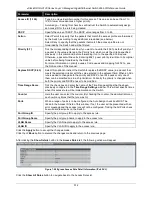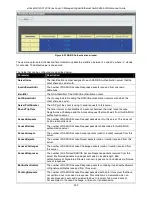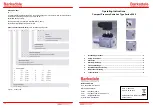
xStack® DGS-3120 Series Layer 3 Managed Gigabit Ethernet Switch Web UI Reference Guide
320
Authentication Server
The Authentication Server is a remote device that is
connected to the same network as the Client and
Authenticator, must be running a RADIUS Server
program and must be configured properly on the
Authenticator (Switch). Clients connected to a port on
the Switch must be authenticated by the Authentication
Server (RADIUS) before attaining any services offered
by the Switch on the LAN. The role of the
Authentication Server is to certify the identity of the
Client attempting to access the network by exchanging
secure information between the RADIUS server and the
Client through EAPOL packets and, in turn, informs the
Switch whether or not the Client is granted access to
the LAN and/or switches services.
Figure 8-3 The Authentication Server
Authenticator
The Authenticator (the Switch) is an intermediary
between the Authentication Server and the Client. The
Authenticator serves two purposes when utilizing the
802.1X function. The first purpose is to request
certification information from the Client through EAPOL
packets, which is the only information allowed to pass
through the Authenticator before access is granted to
the Client. The second purpose of the Authenticator is to
verify the information gathered from the Client with the
Authentication Server, and to then relay that information
back to the Client.
Figure 8-4 The Authenticator
Three steps must be implemented on the Switch to properly configure the Authenticator.
1. The 802.1X State must be
Enabled
. (
Security > 802.1X > 802.1X Global Settings
)
2. The 802.1X settings must be implemented by port (
Security > 802.1X > 802.1X Port Settings
)
3. A RADIUS server must be configured on the Switch. (
Security > RADIUS > Authentication RADIUS
Server Settings
)
Client
The Client is simply the end station that wishes to gain
access to the LAN or switch services. All end stations
must be running software that is compliant with the
802.1X protocol. For users running Windows XP and
Windows Vista, that software is included within the
operating system. All other users are required to attain
802.1X client software from an outside source. The
Client will request access to the LAN and or Switch
through EAPOL packets and, in turn will respond to
requests from the Switch.
Figure 8-5 The Client
Summary of Contents for xStack DGS-3120 Series
Page 1: ......
















































